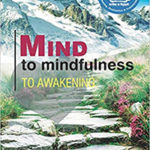
What questions we ask before mindfulness?
Why we are asked to feel sensations in the body and of the breath? Why we use the mantra in meditation/ mindfulness? What contemplation and reflection on the first six steps of the noble path do in the path of mindfulness? Masters have answered the above questions differently but with one goal in mind – allow the mind to move within, live within and awaken within.
Astavakra, the great master gave a beautiful answer to his disciple king, Janaka.
कथं ज्ञानमवाप्नोति, कथं मुक्तिर्भविष्यति।
वैराग्य च कथं प्राप्तमेतद ब्रूहि मम प्रभो॥1.1॥
janaka uvāca kathaṁ jñānamavāpnoti kathaṁ muktirbhaviṣyati vairāgyaṁ ca kathaṁ prāptaṁ etad brūhi mama prabho
Janaka, the seeker asks: How is knowledge to be acquired? How is liberation to be attained? And how is dispassion to be reached? Tell me this, sir.
Mindfulness leads to knowledge (of our true nature), the knowledge of self leads to awakening. It happens when mind moves from distractions (self-created world) to dispassion( right perception).
every master waits for seeker to asks the right question that will lead him to awakening. A student in school answers questions and pass the examination. a stranger asks a question to seek information. But when a seeker asks a question about mindfulness, he is ready and qualify on the path. His questions centers around knowing his true nature.
The real seeker asks how the knowledge of real-self can be attained? How to attain freedom from suffering? How the dispassion is to be attained ( so that illusion and delusion can be dropped)?
when we are not the seeker , we engage in fruitless argument about mindfulness. we create a habit to focus on breath and sensation. we spend too much time in things outside i.e. good studio, fragrance, good clothes, and many things more to succeed in mindfulness. They are all necessary in the beginning but not essential.
we may create a golden space to meditate or go to Himalayas for living in solitude, nothings helps. we may wear golden beads or expensive clothes to meditate, it is wastage. we may google thousands of pages or practice with hundreds of masters, nothing will ever help us succeed. The above four questions should always be in the mind then only other external things and factors can work.
मुक्तिमिच्छसि चेत्तात्, विषयान विषवत्त्यज।
क्षमार्जवदयातोष, सत्यं पीयूषवद्भज॥1.2॥
muktiṁ icchasi cettāta viṣayān viṣavattyaja
kṣamārjavadayātoṣasatyaṁ pīyūṣavad bhaja
Ashtavakra, the master answers – If you aspire to attain awakening (practice mindfulness), give up the passions (desires for sense objects) as poison. Practice ( work on the mind ) forgiveness, simplicity, compassion, contentment and truth as nectar.
The mind needs to be disciplined and educated before we succeed in mindfulness. all four qualities of mind – forgiveness, simplicity, compassion and contentment clears the impurity of mind. they all help the mind to start moving within, leaving the objective reality.
यदि देहं पृथक् कृत्य चिति विश्राम्य तिष्ठसि।
अधुनैव सुखी शान्तो बन्धमुक्तो भविष्यसि॥1.4॥
yadi dehaṁ pṛthak kṛtya citi viśrāmya tiṣṭhasi
adhunaiva sukhī śānto bandhamukto bhaviṣyasi
The master continues to answer -If the seeker allow the mind to separate from the body and rest within within (right perception to witness that the body is not the true nature), then even now one awakens to pace and happiness. The seeker frees oneself from suffering.
this verse explains what happens to mind in the journey of mindfulness. when we are comfortable, mind lives in higher awareness. it becomes deeply aware of the body amd discovers that he is not the body but possess the body. when we possess anything, we can easily separate the possession ( body) from the possessor ( real-self). All distractions are caused due to identification of mind with the body. the identification creates a wrong perception that we are the body which is not true.
mindfulness is not a practice to control the mind from cravings but release of them, because now mind is not interested in distractions. This mind naturally lives within, free from objects from outside. The objectless state is attained. this mind need not to any effort, It is natural and lives within, enjoys within and awakens within. this is mindfulness.


